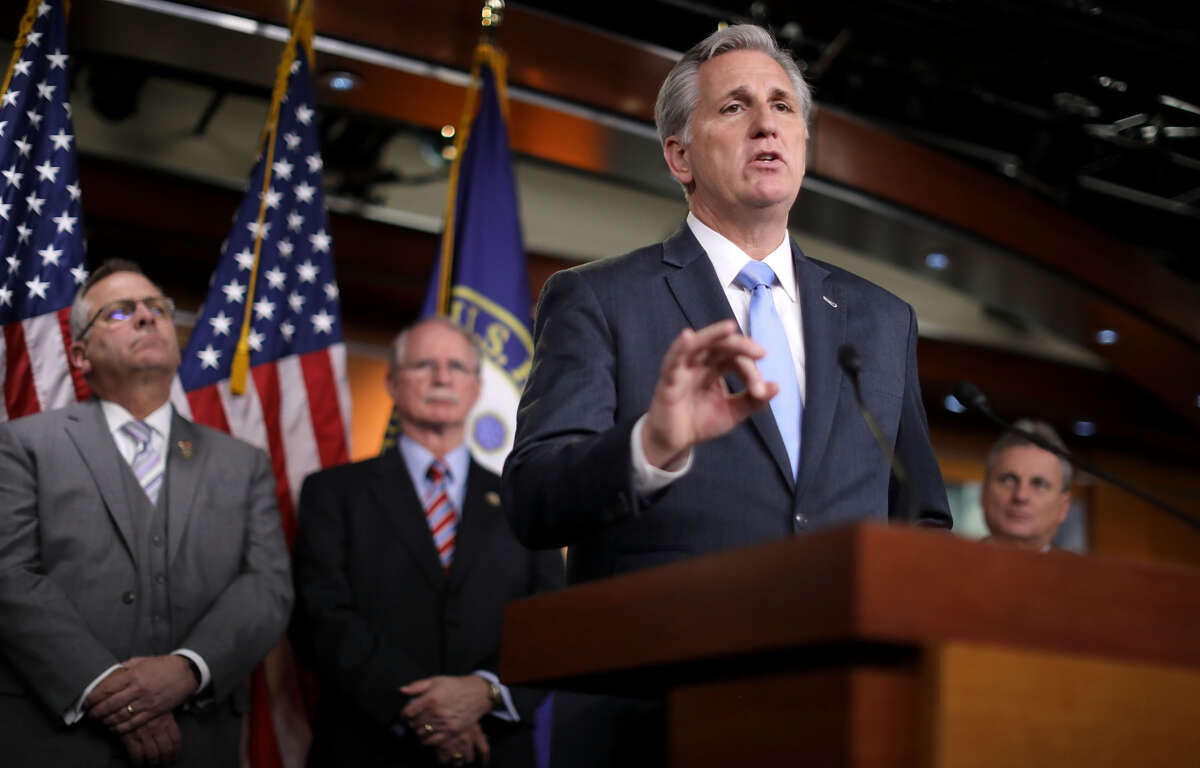The White House is going after congressional Republicans for their current agenda, which the Biden administration says would add trillions of dollars to the national debt while making life materially worse for the American public.
In a fact sheet released on Wednesday, the White House highlighted four different recently proposed Republican policies that, if passed, would collectively add over $3 trillion to the national debt.
“Congressional Republican leaders insist that the national debt is among our nation’s greatest challenges, and reducing it is among their highest priorities. In fact, they claim that reducing the debt is so urgent it warrants endangering the entire U.S. economy through debt limit brinksmanship,” White House officials wrote. “But their legislative agenda to date points in a very different direction — with proposals that would increase the debt by over $3 trillion.”
President Joe Biden is expected to highlight the GOP proposals in a speech on the economy to Maryland union workers on Wednesday.
“If you add up all the proposals that my Republican friends in Congress have offered so far, they would add another $3 trillion to the debt over 10 years,” he is expected to say, per the Associated Press.
The messaging calls into question the sincerity of Republicans who often become deficit hawks under Democratic presidents, while completely disregarding the national debt under Republican leadership. In reality, as the White House points out, Republicans don’t care about the deficit — they care about slashing anti-poverty welfare programs and preventing the government from making the lives of working-class Americans materially easier.
Officials highlighted conservative advocates’ own words in making this argument.
“Grover Norquist, President of Americans for Tax Reform, exposed the political logic of Congressional Republicans’ fiscal hypocrisy. He told Republicans their focus should be ‘not the deficit’ after all: it’s to shift public discussion to cutting spending, paving the way for more tax cuts for the wealthy,” the White House wrote.
“That trickle-down economic theory has never worked. President Trump and President [George W.] Bush’s tax cuts added trillions to the debt and failed to deliver their promised benefits for the economy or American workers,” the fact sheet goes on to say. “And taking revenues — and even savings from cutting corporate subsidies — off the table means Congressional Republicans consistently propose deep cuts to programs seniors and middle-class and working families count on.”
The proposal that would have the most direct effect on the public would be the GOP’s campaign to repeal the Inflation Reduction Act (IRA). Within the IRA is a provision allowing Medicare, for the first time, to negotiate prices for a number of key drugs, which is expected to deliver huge savings for Medicare beneficiaries. Repealing this provision would add $159 billion to the federal deficit, the White House says.
One of the GOP’s deficit-raising proposals was the first bill House Republicans passed with their new majority. Last month, Republicans passed a bill to revoke $70 billion in funding for the Internal Revenue Service (IRS) that Democrats approved in the IRA. A majority of that funding is earmarked for allowing tax agents to go after wealthy tax cheats, rather than maintaining the agency’s trend of disproportionately auditing poor and Black taxpayers, who are often less funding-intensive to audit.
Because the new funding in the IRA enables the IRS to audit and capture taxes from wealthy tax dodgers, it is expected to pay for itself and raise revenue for the government. On the other hand, revoking the funding would add $114 billion to the national debt, according to Congressional Budget Office (CBO) estimates.
The two other proposals by the GOP are focused on even further reducing tax bills for corporations and the wealthy — who have been doing fantastically well as the public has suffered under high inflation. Within the IRA is a 15 percent minimum corporate tax. If repealed, the government would miss out on $296 billion in revenue from some of the U.S.’s largest corporations over the next decade.
The largest addition to the deficit would be the extension of the 2017 Donald Trump tax overhaul, which was a massive gift to the wealthy and corporations. If they make permanent the tax cuts that are slated to expire, as they are planning to do, it would add a whopping $2.7 trillion to the national debt over the next decade — on top of the estimated $1 trillion to $2 trillion it was expected to add through 2025.
Join us in defending the truth before it’s too late
The future of independent journalism is uncertain, and the consequences of losing it are too grave to ignore. To ensure Truthout remains safe, strong, and free, we need to raise $50,000 in the next 10 days. Every dollar raised goes directly toward the costs of producing news you can trust.
Please give what you can — because by supporting us with a tax-deductible donation, you’re not just preserving a source of news, you’re helping to safeguard what’s left of our democracy.
